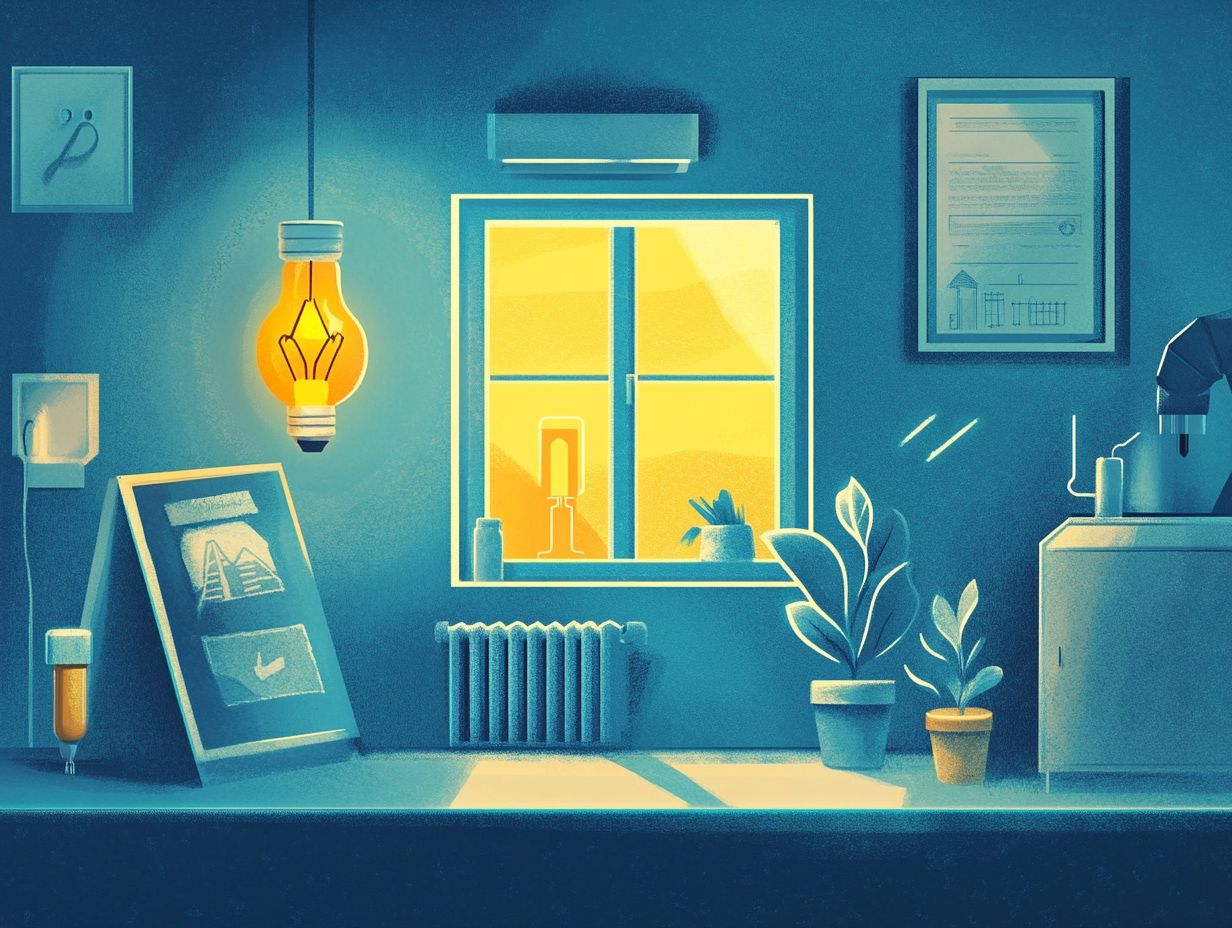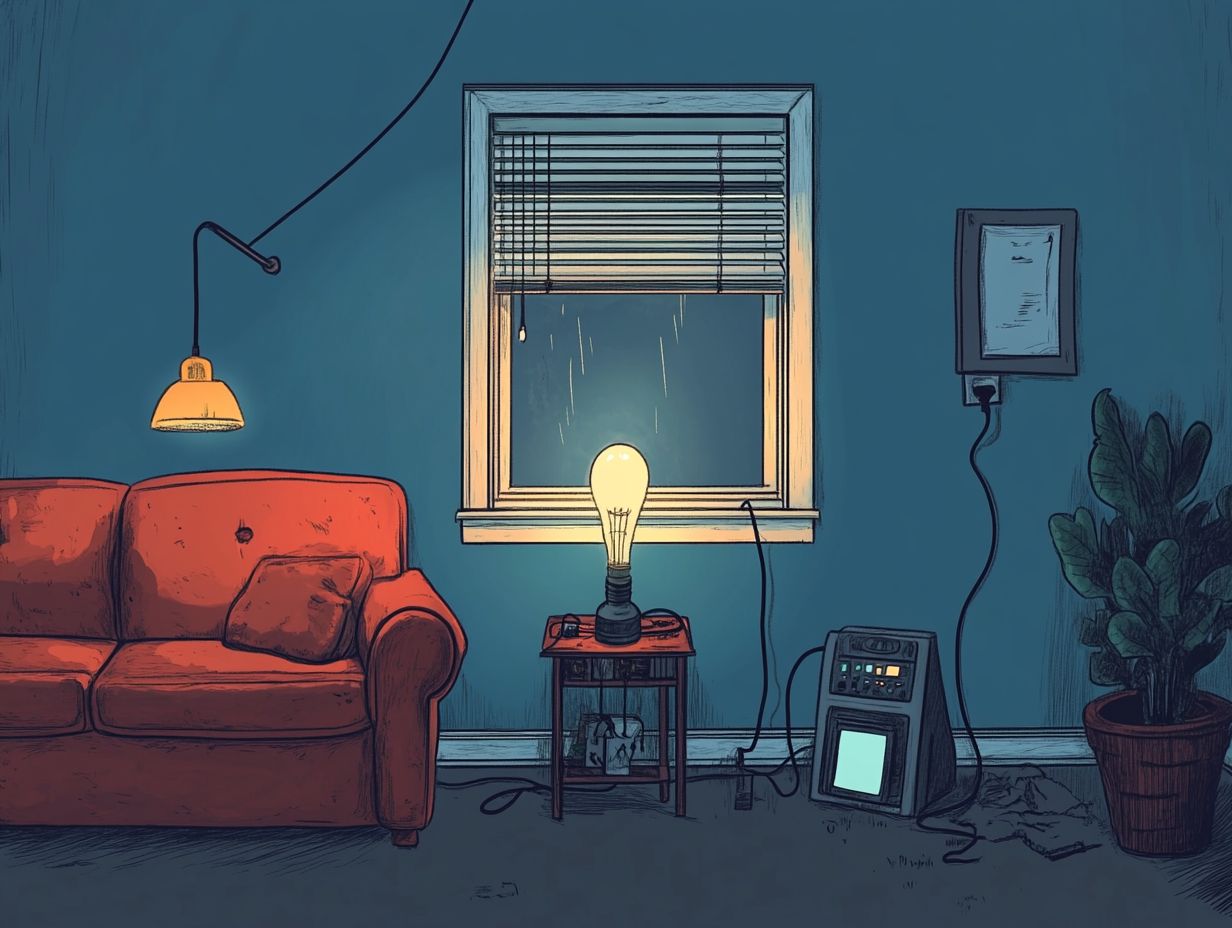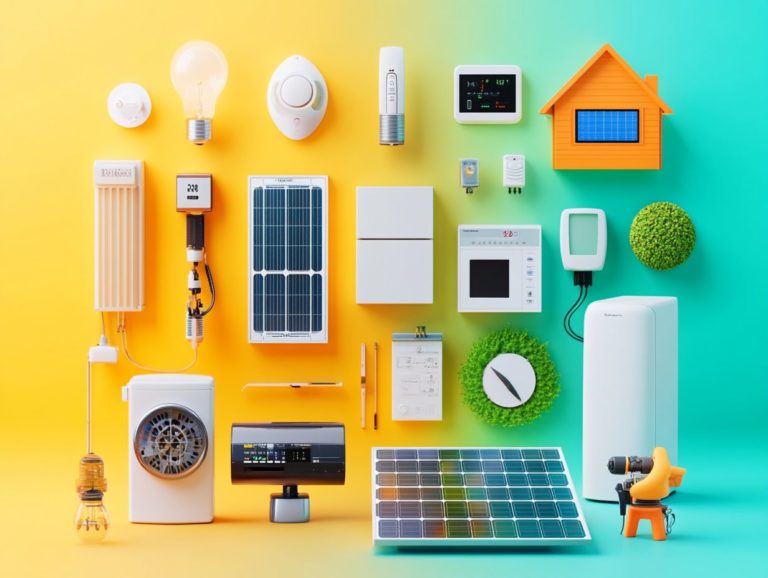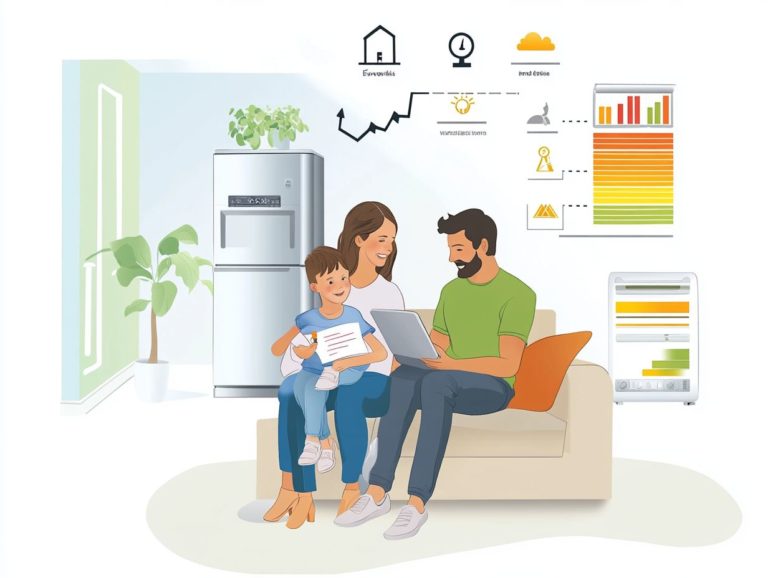5 Signs Your Home Needs an Energy Audit
Are you struggling with high energy bills or finding that some rooms in your home are either much colder or warmer than others? These familiar signs might suggest that your home isn t operating at peak efficiency.
This article delves into five essential indicators that signal it s time for an energy audit an assessment of your home s energy use. From pesky drafts sneaking in through your windows to outdated appliances draining your wallet, we’ve got you covered.
It also outlines what an energy audit involves, its many benefits, and how it can pave the way for long-term savings.
Uncover how a comprehensive assessment can elevate your home’s comfort while trimming those energy expenses.
Contents
- Key Takeaways:
- 1. High Energy Bills
- 2. Uneven Temperatures in Different Rooms
- 3. Drafts or Leaks in Windows and Doors
- 4. Inconsistent Indoor Humidity Levels
- 5. Old or Inefficient Appliances
- What Is an Energy Audit and Why Is It Important?
- Frequently Asked Questions
- What are the top 5 signs that my home needs an energy audit?
- How Can High Energy Bills Indicate That My Home Needs an Energy Audit?
- Why Do Uneven Temperatures in My Home Suggest That I Need an Energy Audit?
- Can a Drafty Room Be a Sign That My Home Needs an Energy Audit?
- What Do Frequent HVAC Repairs Have to Do With Needing an Energy Audit?
- How Can an Old or Outdated Energy System Indicate the Need for an Energy Audit?
Key Takeaways:

1. High Energy Bills
High energy bills? It s time to act your home might need an energy audit now!
2. Uneven Temperatures
Uneven temperatures in different rooms can indicate the need for an energy audit.
3. Drafts or Leaks
Drafts around your windows and doors may suggest an energy audit is necessary.
1. High Energy Bills
High energy bills can be quite vexing and often point to deeper issues within your home, like inefficient appliances or air leaks. These problems significantly affect your energy consumption.
If your HVAC system is outdated, it might struggle to deliver the heating or cooling you need, forcing it to work overtime. This predicament is often compounded when appliances lose their effectiveness over the years, increasing your monthly expenses.
Conducting an energy audit can reveal these hidden inefficiencies. By identifying problem areas, you can implement tailored energy-saving strategies, such as upgrading to modern, energy-efficient appliances or sealing air leaks.
This not only cuts your energy bills but also makes your home more eco-friendly!
2. Uneven Temperatures in Different Rooms
Experiencing uneven temperatures can indicate inefficiencies in your HVAC system or inadequate insulation. Poor air circulation impacts your home s comfort.
When some areas feel like a sauna while others resemble a freezer, it often signals underlying issues that require attention. These temperature imbalances are frequently linked to outdated heating systems or insulation that s improperly installed.
Poorly sealed windows and doors invite drafts, worsening temperature discrepancies. To tackle these challenges, consider an energy audit. This thorough assessment evaluates your home’s energy efficiency, identifies problem areas, and provides recommendations to enhance air distribution.
3. Drafts or Leaks in Windows and Doors
Drafts or leaks around your windows and doors disrupt comfort and lead to energy loss, resulting in higher heating and cooling bills.
Identifying these bothersome drafts is crucial for creating a cozy living space. You might notice sudden temperature shifts near windows or see visible gaps where the frames meet the walls.
Proper insulation is key to sealing off those leaks, ensuring conditioned air stays inside while outside temperatures remain at bay.
Utilizing an energy audit checklist can help you assess your windows and doors effectively. This practical tool guides you in identifying potential trouble spots, making it easier to improve insulation and boost your overall energy efficiency.
Ready to save money? Schedule your energy audit today!
4. Inconsistent Indoor Humidity Levels

Inconsistent indoor humidity levels can lead to moisture build-up, affecting your indoor air quality, which can invite mold growth and cause discomfort.
When humidity soars, it creates a breeding ground for allergens and pathogens. This can be particularly troublesome if you or someone in your household has respiratory issues.
Low humidity makes the air dry, resulting in skin irritations and that annoying static electricity.
Your ventilation system plays a crucial role in managing these fluctuations. It ensures a steady flow of fresh air that helps maintain an optimal balance.
By conducting an energy audit, you can pinpoint inefficiencies within these systems, leading to specific solutions that can fix humidity problems and enhance your overall indoor air quality.
5. Old or Inefficient Appliances
Old or inefficient appliances will impact your energy costs, leading to higher utility bills and a larger carbon footprint due to increased energy consumption. Those outdated units often guzzle more electricity or water than necessary, creating waste and putting unnecessary strain on the environment.
Upgrading to Energy Star-rated models not only enhances your effectiveness but also offers potential savings in both energy bills and maintenance costs over time.
By conducting an energy audit, you can identify specific appliances that drain resources, enabling you to make informed decisions about replacements. By pinpointing these energy hogs, you can transition to more sustainable options that contribute to a greener future while enjoying the advantages of modern technology.
What Is an Energy Audit and Why Is It Important?
An energy audit is a thorough assessment of your home’s energy performance, carried out by a certified auditor. The goal is clear: to identify opportunities for energy savings and enhance your overall energy efficiency.
Throughout this assessment, various diagnostic tools come into play. Blower door tests check for air leaks, while thermographic inspections reveal areas of heat loss or gain. These techniques enable the auditor to pinpoint exactly where energy is being wasted, allowing you to make informed decisions about potential improvements.
By participating in this detailed evaluation, you must act now to save significantly on your utility bills over time. You also play a role in broader environmental initiatives by reducing overall energy consumption.
Ultimately, energy audits are a vital step towards sustainable living and energy conservation.
How Does an Energy Audit Work?
An energy audit involves a careful analysis of your home s energy usage patterns through sophisticated methods. This includes a blower door test designed to detect air leaks and a thermographic inspection that visually reveals thermal inefficiencies.
These assessments provide you with a comprehensive understanding of where energy is slipping through the cracks. They highlight opportunities for enhancement. During the evaluation, the auditor meticulously examines insulation levels in your walls and ceilings, checking for drafts around your windows and doors.
They also assess the efficiency of your heating and cooling systems, along with the performance of your appliances. By pinpointing issues such as outdated HVAC equipment or inadequate sealing, the auditor can recommend targeted upgrades and modifications.
These improvements not only enhance your overall energy efficiency but also lead to reduced utility bills and a more comfortable living environment.
What Are the Benefits of an Energy Audit?

The benefits of an energy audit are extensive and compelling. They offer you the potential for substantial energy and financial savings on your utility bills.
By pinpointing areas where energy is slipping away such as drafty windows and outdated appliances you can make targeted upgrades. These changes not only improve your comfort but also help you make a positive impact on the planet!
Implementing your audit s recommendations can lead to noteworthy long-term savings. This frees up resources for further home improvements and lays the groundwork for a more sustainable and cost-effective living environment.
What Are the Common Areas Checked During an Energy Audit?
During an energy audit, you ll want to focus on key areas like insulation issues, heating and cooling systems (HVAC), air leaks, and the overall efficiency of your appliances. Each of these elements plays a vital role in gauging your home’s energy performance.
Insulation problems can significantly impact your heating and cooling needs. This often leads to increased energy consumption and higher utility bills.
By evaluating your heating and cooling systems, you can uncover inefficiencies that may need repairs or replacements for optimal performance. Don t overlook air leaks, often found around windows and doors, which can create uncomfortable drafts and waste energy.
Assessing the efficiency of your appliances is equally important. You want to ensure they aren t consuming excessive power and identify any that could benefit from upgrades to more energy-efficient models.
Together, these evaluations will give you a comprehensive understanding of potential areas for improvement, paving the way for a more sustainable living environment.
How Can an Energy Audit Help Save Money in the Long Run?
An energy audit is your ticket to long-term savings. It uncovers energy-efficient upgrades that can slash your heating and cooling costs, as well as your overall energy use.
By identifying areas where energy is leaking, you can make changes that trim your bills and elevate your home s comfort. These upgrades like improved insulation or energy-efficient appliances can significantly reduce utility expenses over time.
Plus, many local governments and utility providers offer attractive rebates and incentives to help offset your initial investment, making this option even more enticing. This financial support can spur you into action sooner.
How Often Should a Home Have an Energy Audit?
You should consider scheduling an energy audit every few years or whenever you notice shifts in energy efficiency, high energy bills, or changes in indoor comfort levels.
Certain triggers can heighten the need for these assessments. For instance, if you’re undertaking substantial renovations, such as adding new rooms or upgrading insulation, it s essential to reassess your home’s energy dynamics.
Changes to heating and cooling systems whether through repair or replacement often warrant a fresh examination of your energy consumption. To ensure everything is running optimally, it s wise to book regular check-ups, especially during transitional seasons.
This allows you to make necessary adjustments before peak heating or cooling months hit. Maintaining a consistent schedule not only preserves energy efficiency but also enhances your comfort, leading to significant cost savings.
Frequently Asked Questions

What are the top 5 signs that my home needs an energy audit?
- High energy bills
- Uneven temperatures
- Drafty rooms
- Frequent heating and cooling repairs
- An old or outdated energy system
How Can High Energy Bills Indicate That My Home Needs an Energy Audit?
High energy bills can indicate that your home needs an energy audit because it may not be as energy-efficient as it could be. Preparing your home for an energy audit can help identify areas where your home is losing energy, resulting in high energy costs.
Why Do Uneven Temperatures in My Home Suggest That I Need an Energy Audit?
Uneven temperatures in your home can suggest that you need an energy audit because it may indicate that your home is not properly insulated or sealed. An energy audit can pinpoint areas where air leakage is occurring, causing uneven temperatures throughout your home.
Can a Drafty Room Be a Sign That My Home Needs an Energy Audit?
Yes, a drafty room can be a sign that your home needs an energy audit. Drafts can indicate that there are air leaks in your home, which can lead to higher energy bills and discomfort. An energy audit can help identify and address these drafts, enhancing your home’s energy efficiency and overall comfort.
What Do Frequent HVAC Repairs Have to Do With Needing an Energy Audit?
Frequent HVAC repairs can suggest that your home needs an energy audit because it may indicate that your heating and cooling system is not working efficiently. An energy audit can identify any issues with your HVAC system and provide recommendations for improving its efficiency, reducing the need for frequent repairs.
How Can an Old or Outdated Energy System Indicate the Need for an Energy Audit?
An old or outdated energy system can indicate the need for an energy audit because it may not be running as efficiently as it should. An energy audit can assess your energy system and provide recommendations for upgrades or replacements that can help reduce your energy bills and improve the overall efficiency of your home.






